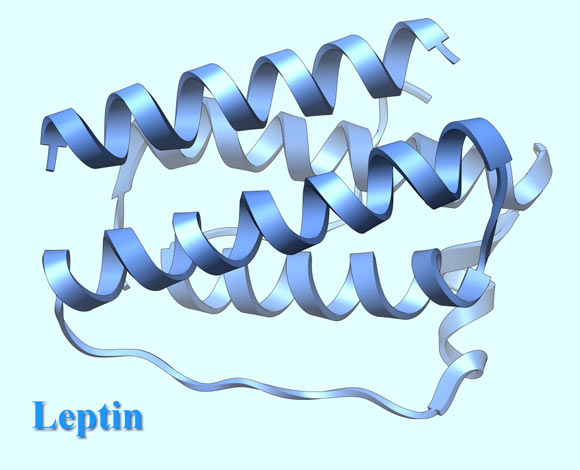Leptin, a hormone secreted by fat cells, informs the brain about sufficiency of fuel stores. When insufficient, leptin levels fall, triggering increases in appetite. A study by researchers from Yale University School of Medicine and Harvard Medical School has demonstrated a mechanism by which low leptin stimulates food intake in rodents.

Perry et al provide evidence for stimulation of a glucocorticoid-AgRP neuron axis that promotes food intake and suggest that AgRP neurons may be an attractive therapeutic target to suppress hyperphagia under conditions of leptin deficiency or glucocorticoid excess including Cushing’s disease. Image credit: N.R. Voss / CC BY-SA 3.0.
Leptin informs the brain when fuel stored in body fat and in the liver is becoming depleted.
It has not been well understood how low leptin concentrations in plasma — the largest component of blood — increase appetite.
The researchers studied the biology of leptin in rodents. They investigated the influence of nerve cells in the brain known as AgRP neurons (agouti-related peptide neurons), which regulate eating behavior.
They discovered that the mechanisms by which reductions in plasma leptin concentrations stimulate food intake are not limited to the brain, as previously thought.
In rodents, fasting first activates leptin receptors in the brain, followed by an intermediary step that involves the endocrine system.
This system includes the pituitary and adrenal glands, which secrete another hormone, corticosterone, that regulates energy, stress responses, and food intake.
“We learned that this chain of events is required for leptin to stimulate hunger when food is restricted, or when diabetes is poorly controlled and plasma leptin concentrations drop below a critical threshold,” said Yale Professor Gerald Shulman, co-lead author of the study.
In further experiments, the team showed that plasma corticosterone activates AgRP neurons, which increases hunger when either leptin or blood-sugar levels are low. In humans, leptin and blood sugar drop when people diet.
“The study reveals the basic biology of leptin, and how the endocrine system is mediating its effect to regulate food intake under conditions of starvation and poorly controlled diabetes,” Professor Shulman said.
“It lends support to a different strategy for developing drugs that treat obesity. It suggests that AgRP neurons may be an attractive therapeutic target.”
The findings were published in the Proceedings of the National Academy of Sciences.
_____
Rachel J. Perry et al. Leptin’s hunger-suppressing effects are mediated by the hypothalamic-pituitary-adrenocortical axis in rodents. PNAS, published online June 18, 2019; doi: 10.1073/pnas.1901795116







